The Enchantment of Young Thespians
Each year Jane Ohland Cameron writes and directs and new play for aspiring young actors at Theatre Orangeville.
What happens when you combine twenty teenagers, an untried script, a youthful crew and eighteen rehearsal days? Last August, Theatre Orangeville’s Drama Young Company set to work under Jane Ohland Cameron’s guidance to create The Enchantment of Peter Pan. I tagged along.
Week 1 Day 1
Twenty young actors are abuzz with excitement and nervous energy in Theatre Orangeville’s temporary rehearsal space in the Zehrs plaza. On a steamy August morning, in the creative ambience of sets and props from past productions, they await the announcement of the cast list.
The eager young thespians range in age from 11 to 16. Each one of them has already auditioned to secure a place in the four-week summer program that will culminate with a performance on the stage of the Old Town Hall Opera House. Each of them will have a role in The Enchantment of Peter Pan, the play that director and playwright Jane Ohland Cameron has written especially for them. The question is, which role?
In these tense moments, Jane appears as nervous as her young charges, but as the parts are finally read out, each actor accepts his or her designated role with surprising maturity. Within minutes, the first script-reading is underway.
Thirteen of the students have worked in previous productions with Jane, each year honing their performance skills. Others are neophytes, here for their first theatre experience. Many struggle to read their lines – words are stilted and unfamiliar. Some young voices shake, barely audible, while others exude confidence, at risk of overacting. Jane interrupts only when essential, gently nudging her script into reality.
“I consider it a privilege as a playwright to have the opportunity to create original pieces and workshop them with such an enthusiastic cast,” Jane, says.
A privilege and a massive undertaking, to be sure. The challenge of creating characters for twenty aspiring actors and blending dialogue into a cohesive plot that holds the interest of actors and audience is not a job for the faint of heart. But Jane is up to the challenge.
It was her three sons, Greg, Geoff and Chris, who, in 2002, coaxed Jane out of a long hiatus from theatrical work when they signed up for the Theatre Orangeville’s Drama for Young People program.
With a background in acting and script-writing, Jane took a keen interest in her sons’ activities. By the next year she was volunteering and that work convinced her of the need for scripts written especially for young people. Her volunteer work became paid employment, and when Gary Sarazin, who founded the youth program in 1998, left to teach in Dubai in 2005, Jane was asked to take on a leadership role.
“I love this theatre and I love Gary’s philosophy that theatre should be inclusive and not exclusive,” Jane says. “His emphasis was on the process as well as the product because he wanted the kids to celebrate and love theatre.”
This is Jane’s second summer as playwright and director. The 2008 production, Just This Once Upon a Time, was such a success that the script has been accepted for publication in Scripted for Schools II, an online catalogue published by Playwrights Guild of Canada.
Week 2 Day 8
“Focus please, people,” is Jane’s constant mantra as the actors’ confidence builds, friendships are forged and youthful chatter erupts at every opportunity. Half-built Styrofoam rocks and tape designate the set and stage parameters as the actors, scripts in hand, block out their movements.
The energy is palpable as they race toward the final scene for the first time since the initial read-through. Some actors fidget and Jane’s voice, hoarse from a week of steady instruction, betrays a measure of frustration as she brings them to attention. Still, when the final line is executed, the room bursts into spontaneous applause. Jane smiles and the play is born. After lunch they will tackle their roles without scripts.
Following the first week of rehearsal, Jane assessed the skills of the actors and rewrote Act II, making changes from the point of view of a director rather than a playwright. “In some cases the actors were given more than they could handle, so I pulled back and redistributed for their benefit.”
As with many of her concepts, this script began as a single image – a boy in a schoolyard duelling imaginary characters. That image led Jane on an exploration of the magic and terror of her own childhood: memories of post-war Ontario, the influence of Victorian era relatives, her love of the Rocky Mountains, and the thrill of being a teenager in the sixties. Eventually the set, characters, voices and scenes appeared to her, and the play coalesced in her mind.
The complex result follows a group of boarding school students who become lost on a mountain during a field trip. Along with invisible “Fair Folk” and a motley crew of super-chilled yogic hippies, they realize they are in the middle of a mining company’s dynamiting operation. The students, whose names evoke storybook characters such as Tink Bell and Peter Pan, are humorously assisted by a dim-witted fairy godmother and the self-centered good witch Glenda, as they learn about themselves and each other before being rescued. Oddly enough the story works.
Jane brings a lifetime of theatre experience to Orangeville. With a degree in English and drama from the University of Western Ontario and a love for musical theatre, she joined a maverick group of graduates who, under theatre instructor Ken Livingston, created an alternative theatre in London, Ontario.
“The early seventies were a time of great change and the company was small and highly experimental, presenting many original works that provided the opportunity to serve different roles in the theatre,” Jane recalls. Although she tried acting, she was shy and felt a “disconnect” on stage, and she soon turned her theatrical passions to writing and working backstage.
“As a result of that training I have a very holistic approach to theatre. I love how all the pieces are put together,” Jane says. “I understand what it feels like for the actor who doesn’t grasp the role as easily as other actors, and I work hard to help that individual break through.”
Jane also worked for Theatre London during the seventies and wrote a script for its touring show before deciding to take a break from the world of theatre. “My only experience was school and theatre,” Jane says. “I had a fear that if I sat down to write plays they would all be about school and theatres, so I made a very conscious decision to go out and experience other things.”
Nevertheless, after a move to Ottawa, Jane’s scriptwriting continued with a commission from the Canadian International Development Agency to write a musical to educate the public about the international food crisis.
“It was quite a stretch to come up with a variety of ways to talk about food in an entertaining and educational way,” Jane says. The research for Everybody’s Gotta Eat led her to a moral decision to use her royalties from the play to open a bulk food store. For the next decade, she ran the store, along with a variety of other jobs that included writing three episodes of You Can’t Do That on Television.
“Jane’s script is brilliant,” says actor Leela Scott of Hockley Valley. “She does the coolest things. The riddles at the end are like something from a movie.”
Leela, 16, has been taking drama training at Theatre Orangeville since she was seven. After only a week of rehearsal, her experience shows in the sophistication with which she plays Titania, the calm and powerful leader of the Fair Folk, and she serves as a role model for the younger thespians.
Although this is Leela’s last year as a performer with the Young Company, she may yet have an opportunity to stay involved as a graduate. For the first time, Jane has drafted a group of recent Young Company alumni to run the show.
“I found that we were ending up with an increasingly large group of talented young people who, at seventeen, were too old for the program. And there is not always a place for them to continue in the theatre while they are in town,” Jane says. Returning to work as coaches and technicians enriches their theatrical perspective.
Each day Jane meets with the young coaches to discuss how they can assist individual actors and ensure they are proceeding with a singular interpretation of each role. The emphasis is on teamwork and Jane trusts the coaches to pass on their knowledge to the actors.
“I feel a bit like an orchestra leader because there is a lot of work done behind the scenes beyond what I am doing,” Jane says.
Week 3 Day 12
Every six-and-a-half hour rehearsal day begins with yoga and Tai Chi exercises. After that, if they feel inclined, any of the thirty actors, coaches and assistants are encouraged to share their personal stories. “To me that is the heart of what theatre is about,” Jane says. “We are storytellers.”
Acting involves more than reciting lines, and this week the focus is on characterization and body language. Jane brings in the big guns to collaborate: Jenee Gowing, Matthew Shawn Fleming and Ian Walsh lead workshops in movement, voice combined with movement and stage combat, respectively.
Together they review how each character’s personality can be expressed through body language. How, for example, should 13-year-old Michael McCreary move to convey the personality of Hawthorne, whom Michael describes as a “schizoid elf”?
Getting each character’s movements right is a tall order for a large cast on a small stage. Today, it takes nearly an hour to run through what will be a mere ten seconds of performance time, and the sequence will need more polishing before it’s stage-ready. But it’s a start.
The Young Company benefits from some of the theatre’s other professional talent, as well. Among them are costume designer Vandy Simpson, lighting technician Stephen Nixon, and technical director and set designer Beckie Morris. As the students move through their paces, I pop in on Beckie and her assistants. They are up to their elbows in muslin, glue and papier mâché, covering eight Styrofoam rocks.
The set must be sturdy enough to withstand the strain of twenty climbing actors who are not always in the right place at the right time. With just a few days before they move into the theatre it appears there is much to do, but Beckie is confident all will be ready. She is proud of the set – and she should be – on stage those lumps will appear convincingly realistic.
The involvement of professional staff is an important feature of the summer program. Jane wants the students to understand that every person involved in a theatrical production – onstage and off – is equally essential to the final outcome. “If, at the age of eleven or twelve, they learn that, it is a life-long gift that will serve them well in the arts and in life in general.”
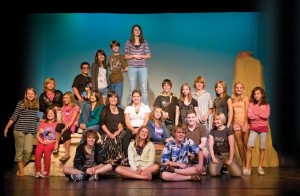
The cast and some of their mentors take a break from rehearsal. Back row, diagonally from left : Virginia Chambers, Rachel Griffith, Daniel Reale, Michelle Vieira, Michael McCreary, Leela Scott. Second row, seated : Jayde Lavoie, Justine Tompkins, Bridget O’Rourke, Jane Ohland Cameron, Erica Causi, Megan Saul. Second row, standing : David Draper, Lindsay Whiting, Eric Goldrup, Nicole Robertson, Holly Bus, Mariel Bulcan-Gnirss. Front row, sitting and kneeling : James Gerus, Jasmine Lagundzija, James Peters, Dean Harris, Megan McCreary. Photo by Pete Paterson.
The only member of Jane’s support network who is truly behind the scenes, but whom she is quick to credit, is her husband Chris, a Caledon East physician. When Jane is involved in a creative project, Chris takes over at home, cooking, cleaning and raising the family. And during the writing process, he and Jane have animated conversations about the script, “almost to the point where I sometimes feel I should give him credit as a co-writer,” she says.
Week 4 Day 16 – The Theatre
“It’s the first stumble-through,” Jane whispers as I slip into the darkened theatre seat beside her and Jenee Gowing. The actors are well prepared and characterization emerges under the stage lights. Jenee encourages the actors to make their movements larger as they deal with unfamiliar surroundings and props.
“Pick up the cues, but don’t race the lines,” Jane calls out as some sections almost grind to a halt and others speed by in a blur of syllables.
The first show is in three days.
“I can’t wait to get on the stage to perform,” says Alton’s Jayde Lavoie. At 11 and in her first year with the Young Company, she is one of the youngest actors. “I’ve learned that acting is what I want to do the most,” she says. “I’m not afraid to express myself in a group of similar people.” Certainly not – Jayde delivers her lines with such unbridled enthusiasm it is impossible not to smile. Her plan is to become an actress and to open an orphanage for seals.
Jane gives credit to the entire theatre staff, technical staff and volunteers for making the process work. “Not only do we have so many artists in this community who are here as mentors and inspiration for the kids, but they are artists who are willing to share their experiences with kids,” she says, citing Theatre Orangeville’s artistic director, David Nairn, as an example. “He is not just promoting what Theatre Orangeville can do for this community, he is promoting what arts can do for young people, and the word is getting out.”
Week 4 Day 19 – Performance
Theatre Orangeville is about half full for the Saturday matinee. Siblings, parents, relatives and friends gather on a hot August afternoon to witness what is undoubtedly an extraordinary event. The charming theatre provides a professional atmosphere that even the youngest audience members seem to respect and the actors perform beyond expectation.
Certainly it isn’t a perfect show. Some actors speak too quickly, some too softly and some stumble with their lines – but that is hardly important. What I have observed during the process is so dramatic that I doubt any of these young people will ever forget it. They have stepped into another world, learning confidence, discipline and respect, along with the impressive results that can be achieved when people work together toward a single goal.
“I feel so lucky because I can’t think of another art form that so totally captures the way I see the world – very holistically with everything connected,” Jane says.
As the curtain falls, her mind is already working overtime. “I’m starting to see cubes, circles and squares and I’m seeing the stage itself on all different levels… but I have no idea where it is going.”
By the time I check in with Jane a few months later, those geometric shapes have miraculously evolved into a play called Feelin’ Groovy, a celebration of Canadian life in the sixties. Note to aspiring thespians of 2010: Dig out the love beads.
More Info
Theatre Orangeville Academy Youth Programs
Drama for Young People programs are offered throughout the year in both drama and musical theatre.
Theatre Orangeville Music Young Company and Theatre Orangeville Drama Young Company provide in-depth theatrical experiences for young people. An audition is required for entry into these summer programs. The programs culminate with a full-scale public production.
Theatre Orangeville Youth Singers (TOYS choir) is a performing choir for children eight years of age and older. The program runs from September to May annually.
For further information about the youth programs, contact the box office at 519-942-3423 or 1-800-424-1295 or visit www.theatreorangeville.ca.

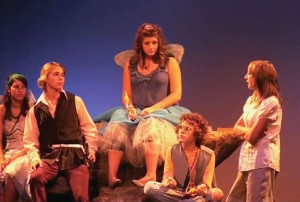
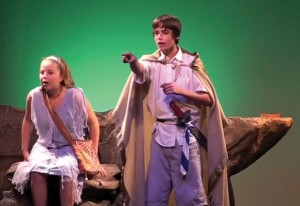
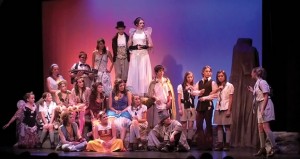

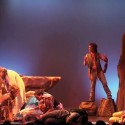
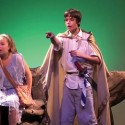
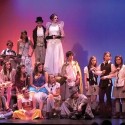

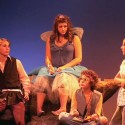
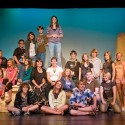
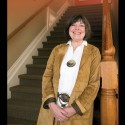






Many thanx for caring so darned much about the arts, kidz and our community …. your new “adventure” is brilliant!
David Nairn on Mar 25, 2010 at 3:53 pm |